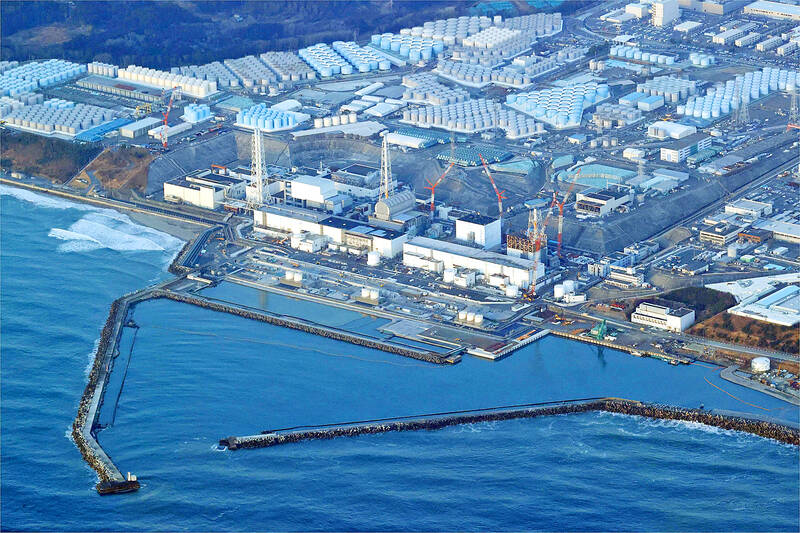Wastewater containing tritium discharged from Fukushima Dai-ichi nuclear power plant is expected to reach Taiwan’s territorial waters in about four years, but as the concentration levels would be below the detection limit, there would be no radiation safety concern, the Atomic Energy Council (AEC) said yesterday.
In April 2021, 10 years after the earthquake and tsunami that wrecked the power plant, the Japanese government announced that it would release radioactive wastewater from the facility, treated using an advanced liquid processing system, into the Pacific Ocean.
An International Atomic Energy Agency task force last year carried out three comprehensive reviews on Tokyo Electric Power Co’s discharge plan, and its preliminary findings, released on Wednesday, said that the company has the technical competence to complete the operation, and its measurements of the treated water were accurate and precise.

Photo: AP
The Japanese government said that simulations showed no increase in radioactivity from the discharged water beyond 3km from the coast, the AEC said.
The radioactivity concentration is only about 1:10,000 to 1:100,000 of the background concentration level, and would be smaller as it is diluted by seawater, it said.
The wastewater would first flow toward the US with the Kuroshio Current and the North Equatorial Current, later returning to the Philippines, and moving north with the Kuroshio Current to Taiwan and Japan, an AEC official said.
It would reach Taiwan’s territorial waters at the end of the circulation, which would take about four years, and the tritium concentration level at that time would be below the instrument detection limit, he said.
As ocean currents are complex, a small portion of the wastewater might flow toward the south along with mesoscale eddies, reaching the seas near Taiwan in a year at the earliest, he added.
The AEC is to work with the Central Weather Bureau to establish a simulation model for the dispersion of radioactive substances in marine ecosystems, and provide a seven-day forecast of the dispersion and impact warning of tritium wastewater to the nearby sea area and fishing grounds after Tokyo Electric Power begins discharging the wastewater.
Regarding testing the levels of tritium in seafood, the AEC official said that the isotope emits weak radiation and can only travel about 5mm through the air, which can be blocked by a piece of paper, so it cannot be directly tested, requiring seafood samples to be delivered to special laboratories for treatment and analysis, which would take about 14 workdays.

In his National Day Rally speech on Sunday, Singaporean Prime Minister Lawrence Wong (黃循財) quoted the Taiwanese song One Small Umbrella (一支小雨傘) to describe his nation’s situation. Wong’s use of such a song shows Singapore’s familiarity with Taiwan’s culture and is a perfect reflection of exchanges between the two nations, Representative to Singapore Tung Chen-yuan (童振源) said yesterday in a post on Facebook. Wong quoted the song, saying: “As the rain gets heavier, I will take care of you, and you,” in Mandarin, using it as a metaphor for Singaporeans coming together to face challenges. Other Singaporean politicians have also used Taiwanese songs

NORTHERN STRIKE: Taiwanese military personnel have been training ‘in strategic and tactical battle operations’ in Michigan, a former US diplomat said More than 500 Taiwanese troops participated in this year’s Northern Strike military exercise held at Lake Michigan by the US, a Pentagon-run news outlet reported yesterday. The Michigan National Guard-sponsored drill involved 7,500 military personnel from 36 nations and territories around the world, the Stars and Stripes said. This year’s edition of Northern Strike, which concluded on Sunday, simulated a war in the Indo-Pacific region in a departure from its traditional European focus, it said. The change indicated a greater shift in the US armed forces’ attention to a potential conflict in Asia, it added. Citing a briefing by a Michigan National Guard senior

CHIPMAKING INVESTMENT: J.W. Kuo told legislators that Department of Investment Review approval would be needed were Washington to seek a TSMC board seat Minister of Economic Affairs J.W. Kuo (郭智輝) yesterday said he received information about a possible US government investment in Taiwan Semiconductor Manufacturing Co (TSMC, 台積電) and an assessment of the possible effect on the firm requires further discussion. If the US were to invest in TSMC, the plan would need to be reviewed by the Department of Investment Review, Kuo told reporters ahead of a hearing of the legislature’s Economics Committee. Kuo’s remarks came after US Secretary of Commerce Howard Lutnick on Tuesday said that the US government is looking into the federal government taking equity stakes in computer chip manufacturers that

CLAMPING DOWN: At the preliminary stage on Jan. 1 next year, only core personnel of the military, the civil service and public schools would be subject to inspections Regular checks are to be conducted from next year to clamp down on military personnel, civil servants and public-school teachers with Chinese citizenship or Chinese household registration, the Mainland Affairs Council (MAC) said yesterday. Article 9-1 of the Act Governing Relations Between the People of the Taiwan Area and the Mainland Area (臺灣地區與大陸地區人民關係條例) stipulates that Taiwanese who obtain Chinese household registration or a Chinese passport would be deprived of their Taiwanese citizenship and lose their right to work in the military, public service or public schools, it said. To identify and prevent the illegal employment of holders of Chinese ID cards or